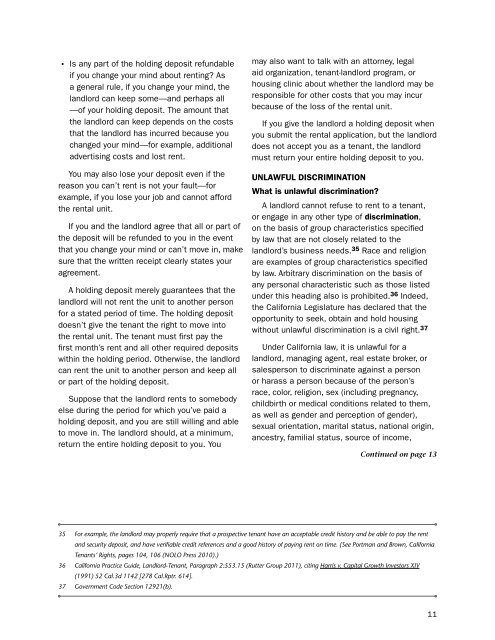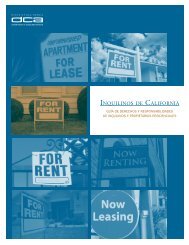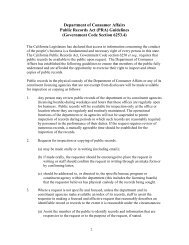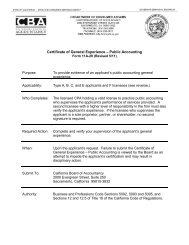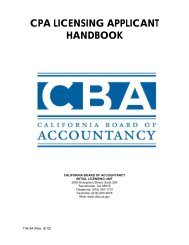California Tenants - Department of Consumer Affairs - State of ...
California Tenants - Department of Consumer Affairs - State of ...
California Tenants - Department of Consumer Affairs - State of ...
You also want an ePaper? Increase the reach of your titles
YUMPU automatically turns print PDFs into web optimized ePapers that Google loves.
• is any part <strong>of</strong> the holding deposit refundable<br />
if you change your mind about renting? As<br />
a general rule, if you change your mind, the<br />
landlord can keep some—and perhaps all<br />
—<strong>of</strong> your holding deposit. the amount that<br />
the landlord can keep depends on the costs<br />
that the landlord has incurred because you<br />
changed your mind—for example, additional<br />
advertising costs and lost rent.<br />
You may also lose your deposit even if the<br />
reason you can’t rent is not your fault—for<br />
example, if you lose your job and cannot afford<br />
the rental unit.<br />
if you and the landlord agree that all or part <strong>of</strong><br />
the deposit will be refunded to you in the event<br />
that you change your mind or can’t move in, make<br />
sure that the written receipt clearly states your<br />
agreement.<br />
A holding deposit merely guarantees that the<br />
landlord will not rent the unit to another person<br />
for a stated period <strong>of</strong> time. the holding deposit<br />
doesn’t give the tenant the right to move into<br />
the rental unit. the tenant must first pay the<br />
first month’s rent and all other required deposits<br />
within the holding period. otherwise, the landlord<br />
can rent the unit to another person and keep all<br />
or part <strong>of</strong> the holding deposit.<br />
suppose that the landlord rents to somebody<br />
else during the period for which you’ve paid a<br />
holding deposit, and you are still willing and able<br />
to move in. the landlord should, at a minimum,<br />
return the entire holding deposit to you. You<br />
may also want to talk with an attorney, legal<br />
aid organization, tenant-landlord program, or<br />
housing clinic about whether the landlord may be<br />
responsible for other costs that you may incur<br />
because <strong>of</strong> the loss <strong>of</strong> the rental unit.<br />
if you give the landlord a holding deposit when<br />
you submit the rental application, but the landlord<br />
does not accept you as a tenant, the landlord<br />
must return your entire holding deposit to you.<br />
uNlawful discrimiNatioN<br />
what is unlawful discrimination?<br />
A landlord cannot refuse to rent to a tenant,<br />
or engage in any other type <strong>of</strong> discrimination,<br />
on the basis <strong>of</strong> group characteristics specified<br />
by law that are not closely related to the<br />
landlord’s business needs. 35 Race and religion<br />
are examples <strong>of</strong> group characteristics specified<br />
by law. Arbitrary discrimination on the basis <strong>of</strong><br />
any personal characteristic such as those listed<br />
under this heading also is prohibited. 36 indeed,<br />
the <strong>California</strong> legislature has declared that the<br />
opportunity to seek, obtain and hold housing<br />
without unlawful discrimination is a civil right. 37<br />
under <strong>California</strong> law, it is unlawful for a<br />
landlord, managing agent, real estate broker, or<br />
salesperson to discriminate against a person<br />
or harass a person because <strong>of</strong> the person’s<br />
race, color, religion, sex (including pregnancy,<br />
childbirth or medical conditions related to them,<br />
as well as gender and perception <strong>of</strong> gender),<br />
sexual orientation, marital status, national origin,<br />
ancestry, familial status, source <strong>of</strong> income,<br />
Continued on page 13<br />
35 For example, the landlord may properly require that a prospective tenant have an acceptable credit history and be able to pay the rent<br />
and security deposit, and have verifiable credit references and a good history <strong>of</strong> paying rent on time. (See Portman and Brown, <strong>California</strong><br />
<strong>Tenants</strong>’ Rights, pages 104, 106 (NOLO Press 2010).)<br />
36 <strong>California</strong> Practice Guide, Landlord-Tenant, Paragraph 2:553.15 (Rutter Group 2011), citing Harris v. Capital Growth Investors XIV<br />
(1991) 52 Cal.3d 1142 [278 Cal.Rptr. 614].<br />
37 Government Code Section 12921(b).<br />
11


